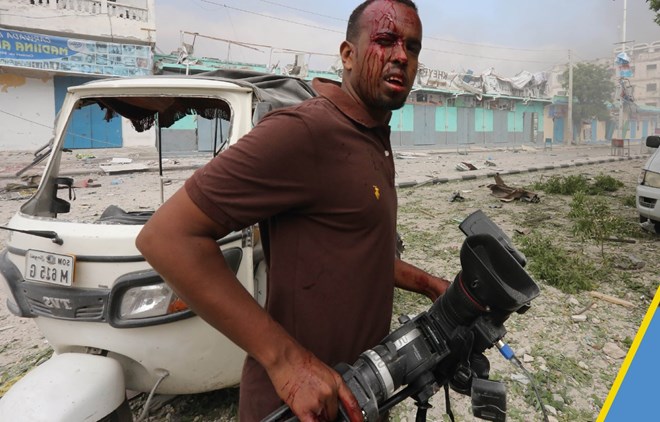
Wednesday November 2, 2022

To mark the International Day to End Impunity for Crimes against Journalists, the National Union of Somali Journalists (NUSOJ), with technical support from the International Labour Organisation (ILO), has today released a damning report that exposes the depth of impunity and crimes committed against journalists, while calling on the Federal Government of Somalia to reaffirm, recommit and reposition to advancing the UN Plan of Action on the Safety of Journalists and the Issue of Impunity.
The report, “Safe to Report – Towards Personal and Professional Safety for Journalists in Somalia”, outlines why, as a result of increasing media work-related deaths, injury, arrest, intimidation and post-traumatic exposure to violence, Somalia has earned itself the dubious distinction of being the deadliest place to be a journalist in Africa in the past 10 years.
Physical safety is the foremost challenge facing Somali journalists. From 2012 to 2022, fifty-four (54) journalists have been killed in Somalia, fifty (50) having been injured in the line of duty. Many more have been facing routine threats by both state and non-state actors, and are arbitrarily arrested, prosecuted and convicted on trumped-up charges. Women journalists face particular dangers, including online and sexual harassment, assault at and outside the workplace. This attitude is often informed and reinforced by the conservative and patriarchal views that oppose women’s empowerment outside the domestic setting.
The report makes it clear that Somalia’s legal environment regarding media freedoms and safety of journalists in particular, is desperately wanting. Journalists increasingly face the risk of prosecution as the legal regime is skewed towards control rather than facilitation and protection of journalistic freedoms. This culture and practice are in direct contradiction to Article 18 of Somalia’s Provisional Constitution. Coupled with this, is the country’s failure to domesticate and implement international conventions and human rights instruments that Somalia has ratified.
The Amended Media Law, signed in August 2020 does not protect the fundamental rights of journalists and imposes unspecified fines on journalists who contravene its provisions. Setting the tone for all this is the outdated 1964 Penal Code, which has been used to indiscriminately arrest and oppress journalists by criminalising journalism.
Despite continued advocacy and efforts to make the Somali authorities, both at the federal and state levels, aware of the serious security challenges facing journalists, the protests have fallen on deaf ears. In May 2020, NUSOJ filed a legal petition seeking justice for the killings of more than 55 journalists. The Attorney General has also appointed a Special Prosecutor for crimes against journalists although the lack of resources and capacity hampers the functioning and impact of this important office.
The attitude of certain administrators in Somalia and the failure to punish those who undermine media freedom and those who direct violence at journalists, has set the tone for how the public and private actors perceive journalists and journalism.
“A sustained practice of human rights abuse against journalists has instilled an insidious culture of impunity,” says NUSOJ Secretary General, Omar Faruk Osman. “Lines of accountability for violence against journalists either do not exist or have been deeply fractured. Certain sections of the security agencies view journalists as adversaries and this serves as a motivation to violate their human and professional rights. The cumulative result of all this, is that journalists have resorted to self-censorship in a bid for self-preservation, a trend that has a notable effect on the quality of journalism and the potency of stories and information to challenge the status quo.”
The report has also elaborated the challenges facing journalists within the context of the youth, a consideration that must be placed high in the consciousness of policy makers and civil society alike. Somalia has a burgeoning young population and young journalists are displaying a positive desire and willingness to join the journalism profession, despite the unparalleled risks to their safety and the appalling working conditions. NUSOJ, along with its partners, has been working to implement capacity building initiatives to assist young journalists to be prepared for the rigours and challenges of the profession.
The report highlights a number of best practices for protecting journalists in Somalia, from individualistic approaches such as increased vigilance on the part of the journalist, to ensuring gender responsive policies, including gender-based violence issues, are integrated into the work of media houses. There are also specific efforts and initiatives that should be championed by all state structures, media community and civil society, if a comprehensive approach that harnesses all energies is to be achieved.
The new political dispensation also offers opportunities for real change. NUSOJ hopes that the Federal Government will adopt the uniform domestication and effective application of international standards that Somalia has already ratified, such as the ILO conventions on Occupational Safety and Health as well as the realization of the National Action Plan on the Safety of Journalists (NAP) and the UN Plan of Action on Safety of Journalists and the Issue of Impunity.
Ensuring the UN Plan of Action on the Safety of Journalists and the Issue of Impunity in Somalia through the well-thought-out implementation of NAP as a living and dynamic framework, means embracing meaningful and sustained change at a policy, programmatic and partnership level. Positive cooperation and support between journalists, security forces and the judiciary on the prevention and protection of the safety of journalists needs to be boosted and taken to higher levels for positive results.